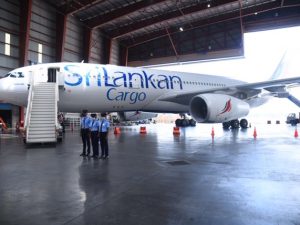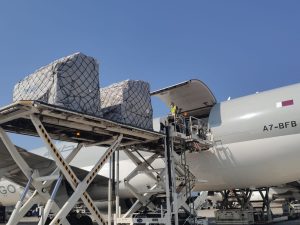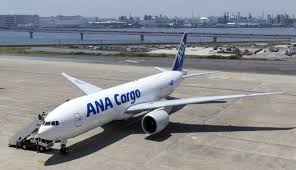SriLankan Airlines has converted a wide-body passenger aircraft into a dedicated cargo aircraft to support country’s export industries and to keep the country connected with the global economy during the pandemic. The aircraft will fly a total of 170 cubic metres of cargo capacity with the enhanced 60 cubic metres of cargo on its upper deck with 110 cubic metres carried on the lower deck. The total payload of the aircraft will amount 45 metric tonns. The converted A330 aircraft has commenced operations from June 25 to key destinations in the Far East and Europe. Chamara Ranasinghe, Head – Cargo, SriLankan Airlines, said, “With the poor demand for passenger travel and the consequent reduction of air freight capacity in the global market has left a significant void for global supply chains. The past few months have seen SriLankan Airlines operating several routes specifically to cater to this demand for cargo capacity with our fleet of passenger aircraft. The converted operation comes at an ideal time for providing customers with enhanced volume capacity in maximizing the connectivity per flight.” Ashok Pathirage, Chairman, SriLankan Airlines said, “We have transformed this aircraft to allow maximum cargo capacity with main deck loading in addition to the aircraft’s lower deck cargo hold to mainly support the needs of our export industries, as well as our imports sector, during the current global shortage of air cargo capacity and to strengthen the airline’s revenue stream during a time when the air transport industry is in crisis.” The reconfiguration of the aircraft was carried out in-house at the airline’s hub at Bandaranaike International Airport, where the SriLankan Airlines’ engineering team worked around the clock. The new operational configuration …
Read More »SAL launches pharma facilities with 14,000 tonnes per year capacity at KFIA
Saudi Arabian Logistics (SAL) has launched the operations of its state-of-the-art pharma facilities recently opened at the King Fahd International Airport’s Cargo Village in Dammam. The new warehouses will support the infrastructure of pharma and medical equipment handling facilities as per the international standards of the World Health Organization (WHO), the European Union Good Distribution Practice and Saudi Food and Drug Authority (SFDA). Before the expansion, the total area of the medical storage facilities stood at 118 square meters but after expansion, it reached 542 square meters with an operational capacity of 14,000 tonnes a year as follows: 262 square meters of the facilities are dedicated for storing goods with temperature ranging between 15-25 celsius whereas 262 square meters are used for storing goods with a temperature between 2-8 celsius. The facilities can also be used for storing different types of medical cargos with very low temperatures, below zero. Omar Hariri, CEO, SAL, says “We usher in a new phase of advanced cargo handling services for pharma and medical equipment. We are creating the proper environment and developing the infrastructure needed for the current period, which has seen an increasing demand for pharma and medical equipment cargos during the Covid-19 pandemic.”
Read More »DHL Global Forwarding launches Chitose–Hong Kong charter service
In order to serve scallop producers in the region of Hokkaido, Japan, DHL Global Forwarding (GH) has launched a thrice-weekly charter from Chitose in Japan to Hong Kong. Harvesting for scallops in Hokkaido typically begins in June and ends in October. The charter is the only direct airfreight service from Hokkaido’s main international airport to Hong Kong since airlines halted international flights from the airport as a result of the Covid-19 pandemic. Since authorities had imposed virus-related travel restrictions, exporters from Hokkaido were unable to fly scallops and other perishables to Hong Kong, which is the top importer of Japanese agricultural and marine products and also a gateway to mainland China. According to DHL GF, scallops make up the largest portion of seafood that it ships out of Japan and primarily from Hokkaido.
Read More »Qatar Airways join hands with Airlink to deliver Covid-19 relief
Qatar Airways has signed an agreement with Airlink to transport 200 tonnes of humanitarian aid over the next two years for free of charge. The move was undertaken to help prevent the spread of Covid-19. Guillaume Halleux, Chief Officer – Cargo, Qatar Airways, says, “The Covid-19 pandemic has shown how essential air freight is to responding to crises and we are pleased to support the work of governments and NGOs around the globe, transporting essential supplies to places where they are needed.” Steven J Smith, President & Chief Executive, Airlink, adds, “The 200 tonnes of freight space is a generous donation that will help fragile communities now, amid the Covid-19 pandemic, and in future disasters.
Read More »Collaborative approach keeps air cargo flying: Manoj Singh, Mumbai Airport
Talking in the second digital conclave of CargoTalk, Manoj Singh, Senior Vice President & Head – Cargo, Mumbai Airport shared his experience on how Mumbai Airport has overcome the challenges with the help of stakeholders’ collaborative approach. He said, “We, as an industry, have learned a lot with the Covid crisis. It is a new experience for all of us and as an air cargo industry player we look forward for the continuity even after this Covid gets out. This sector is playing a major role at this stage and in future there is a possibility of further growth.” “We, as a stakeholder, have really worked hard to keep the things moving. It is not possible to achieve these numbers without the combination of all the stakeholders working towards the same goal,” he adds.
Read More »Associations need to work together to ensure liquidity: Yashpal Sharma, ACFI
Commenting on the cargo stakeholders’ decision of handling shipments only against 100 per cent advance payments by their clients, at CargoTalk’s second digital conclave, Yashpal Sharma, Hon. Secretary, Air Cargo Forum India (ACFI), says, “There are lot of cash and carry requirements and lot of stakeholders currently are in a big cash constraints as well as there is huge credit default risk in the market which is what we as an association would also need to work together with all stakeholders to ensure liquidity, less default risk in the market and least amount of blockage of funds from the shipper, consignee, etc.” “What is important is to make sure the circulation keep going. Diverting it from associations’ perspective to freight forwarders’ perspective, Sharma suggests, “We are prompting everybody to pay at least the current transactions now and also add something for the previous dues they have with us. Ultimately, we also have to help those businesses to run, we cannot ask them to pay 100 per cent,” he continues.
Read More »Freight rate control mechanism is the need of the hour: Sunil Arora, ACAAI
Sharing his perspective on high freight rates at CargoTalk’s second digital conclave, Sunil Arora, President, The Air Cargo Agents Associations of India (ACAAI), said, “The rates have not gone high because of low supply or high demand; it is when both the demand and supply have collapsed yet the freight rates have gone up three or four times. It is a very peculiar and unique situation, we need to consider that the direct impact of the high freight rate are not only on the logistics cost but also on the merchandise. Some sort of rate control mechanism has to come in. We must really be considerate towards the ex-im trade who has been supporting the airlines in good and bad times.”
Read More »Agility opens 11,000 sqm facility in Barcelona, Spain
In order to expand its reach in Spain, Agility has opened a state-of-the-art, 11,000-square-meter warehouse and office facility at ZAL Port (Prat) in the Port of Barcelona. The new building addresses the current needs and planned growth of Agility Spain; equipped with state-of-the-art technology for logistics. Features of the warehouse include free height of 11 meters in the storage area and a deck roof built on site. The plot is equipped with 56 private parking spaces distributed in two areas and 25 loading gates with automatic sectional doors and external shelters. “Agility Spain offers extensive experience with three customs warehouses, temperature-controlled management, and the GDP certification required by pharmaceutical companies,” says Carlos Martinez, Sales Director, Agility Spain, in adding, “We focus on the renewable and engineering sectors, project logistics, transportation management, and turnkey projects for large-scale and complex initiatives.”
Read More »ANA Cargo expands its digital solutions
To meet the accelerated demand for e-booking solutions, All Nippon Airways (ANA) has announced that the airline would be able to provide real-time quotes for all available air cargo capacity on e-booking platform named cargo.one. The participation was first announced in February. “The Covid-19 pandemic has been a catalyst for the increased digital sourcing and booking behaviour of freight forwarders and has encouraged our companies to join together with an even stronger bond,” says, Toshiaki Toyama, Executive Vice President, ANA. Last week, cargo.one also announced that it had developed ‘plug and play’ capabilities with IBS Software which means that airlines using the iCargo system, such as ANA, could easily offer their capacity on the booking platform.
Read More »Agriculture & pharmaceutical sectors are ready to take the lead in logistics: Vipin Vohra
“We must always keep it in mind that we have pharma and agriculture sector ready to take the lead. The country’s pharmaceutical sector has great potential and government must encourage it by investing in R&D and by providing better facilities and incentives to the private sector to enhance its production for exports.” says Vipin Vohra, Chairman, Continental Carriers at CargoTalk’s, first digital conclave. “This is the right time to maximise opportunity by being innovative, utilising skilled labour, bringing professionalism, networking aggressively and adopting PR strategies along with identifying the latest technology,” he continues. “Secondly, there should be more collaboration and cooperation among each other in order to reduce expenses wherever we can,” he adds.
Read More » Cargo Breaking News
Cargo Breaking News









